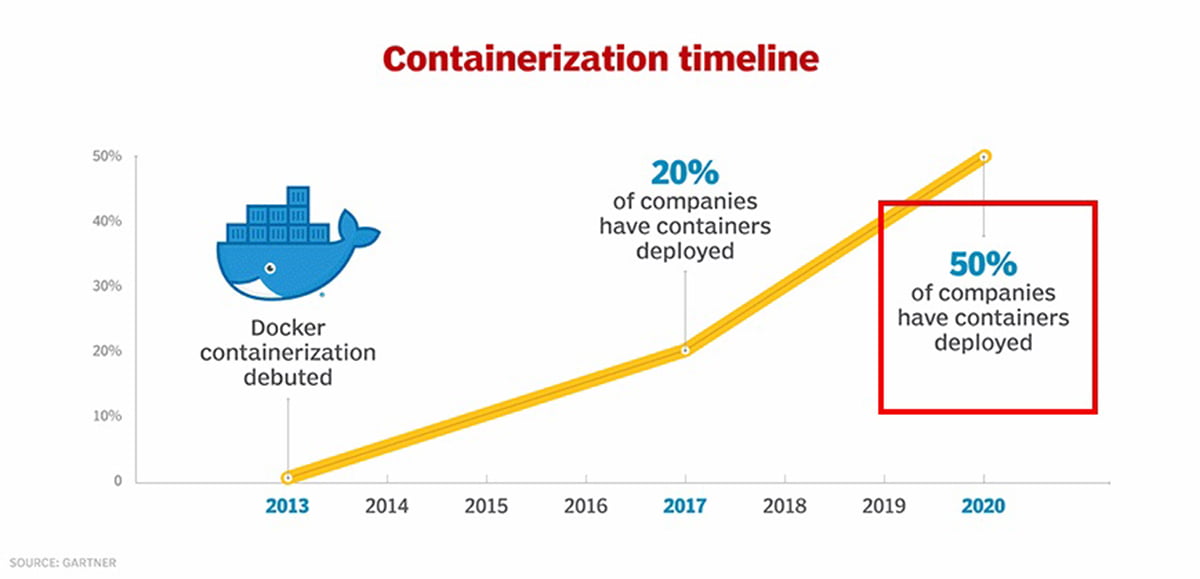Innovation is at the core of business operations. Companies that innovate business operations effectively can gain greater market share and leave competitors behind. Cloud computing is part of this innovation. And with cloud comes containers.
Q3 2020 hedge fund letters, conferences and more
The infrastructure enhancements needed to stay innovative spawned from the application business transformation the digital era has ushered in. The development, deployment, and updates of business apps are a must for future business continuity.
Containerization has revolutionized application development and delivery stages many companies rely on for a competitive edge. Utilizing containers via Docker and a container registry has become commonplace for companies large and small.
Why Containers Are Effective For Companies Utilizing Cloud
Containers essentially eliminate the need for clunky virtual machines, allowing DevOps teams to develop and deploy lightweight, highly portable applications faster and easier.
Companies utilizing the cloud can tether containers to the app development and deployment process for a competitive edge. Instead of having a single application dedicated to one virtual machine, multiple applications, the app libraries, and more can all be packaged together.
The portability is also enhanced, since containers allow for applications to run on multiple operating systems. This is why more than 50 percent of companies have deployed containers . . .
If you’re still on the fence about containerization, it is time to consider the benefits. You may be losing market share due to deficiencies in your company’s application development processes. Especially if your company is utilizing cloud computing.
From security to scalability, let’s take a closer look at the business benefits containers serve up.
Containers Serve Up Enhanced Security
Containers are unique, because they do not interact with other containers, making them self-contained. This means that if one container crashes, other containers utilizing the same resources will continue to run with zero downtime.
When it comes to security, having standalone containers keeps cyber attacks to a minimum. If one container is hacked, the other containers, even though they are utilizing the same resources, will remain safe.
And when a hack occurs, the container that is at risk can quickly be stopped in seconds. This is due to the lean nature of containers. This keeps all other enterprise systems safe from further problems.
Containers Provide Consistency
Consistency is absolutely critical when it comes to business operations. Containers are separate from the environments they run on, allowing software developers to deploy container applications across multiple environments quickly. This applies to cloud, as well as traditional data centers.
Having things isolated within the development and deployment environment helps companies utilizing cloud to leverage consistency. The software dependencies a container possesses, like the app libraries, lets developers run apps on any device consistently, and without fail.
Agility Simplified For Mid-Cap Companies
Managing updates and business operations is made easier when application processes are isolated from operating systems. This allows mic-cap companies with less resources to leverage containers for greater success. But it does depend on the containerization partner the company has in place.
It is essential to find container orchestration with automation at the forefront. A containerization partner that does this can help a smaller company with machine management, services, and microservices.
If you are a smaller company ready to utilize containers, a partner with containerization expertise can make the process easier. This can reduce need for resources, time, and other important business factors.
Containers Serve Up Greater Productivity
The lightweight and stand alone nature of containers makes productivity enhancements possible for companies utilizing cloud computing.
For instance, your IT team can engage in the daily needs while developers focus on application intricacies like dependencies and logic. Operations teams can then aim for enhanced management and deployment.
This is the container recipe for greater productivity. Having containerization tethered to cloud computing gives all teams more time and resources to focus on what they do best.
Replication Made Easy In Cloud Environment
Replicating applications is an effective process when using containers in the cloud environment. Prior to the use of containers, it was challenging for IT and development teams to duplicate what worked well due to host dependencies.
Containers are independent of platforms, giving them unprecedented portability. The self-contained package of a container application makes it separate from the operating system, code, and machine. And since container packages are lean, the ability to duplicate is made easy.
Containers Serve Up Scalability
Scalability is a must for companies, especially those utilizing cloud computing. Cloud computing already provides scalability, but tethered with containers, that scalability becomes more powerful.
More workloads means greater scalability, and containers facilitate this. Reconfiguring architectures for added resources and/or containers helps companies achieve scalability with containerization and cloud.
You can easily implement more features and updates faster, all without reconfiguring the original app. Having this in place also minimizes the need for more resources.
Application Management Is Streamlined
Containers also serve up application management benefits for companies utilizing the cloud. For example, orchestration tools allow DevOps teams to manage apps, automate deployment, manage workloads, and more.
The processes used for enhanced application management via container orchestration tools include version updates, code debugging, logs, and greater security by identifying problematic areas within a container.
In Conclusion . . .
The business benefits containers serve up for companies utilizing cloud are pretty clear. If your company, large or small, is still considering full container adoption via Docker and container registry, it may be time to take next steps. You can be sure your competitors are. How can containers benefit your company in 2021?






